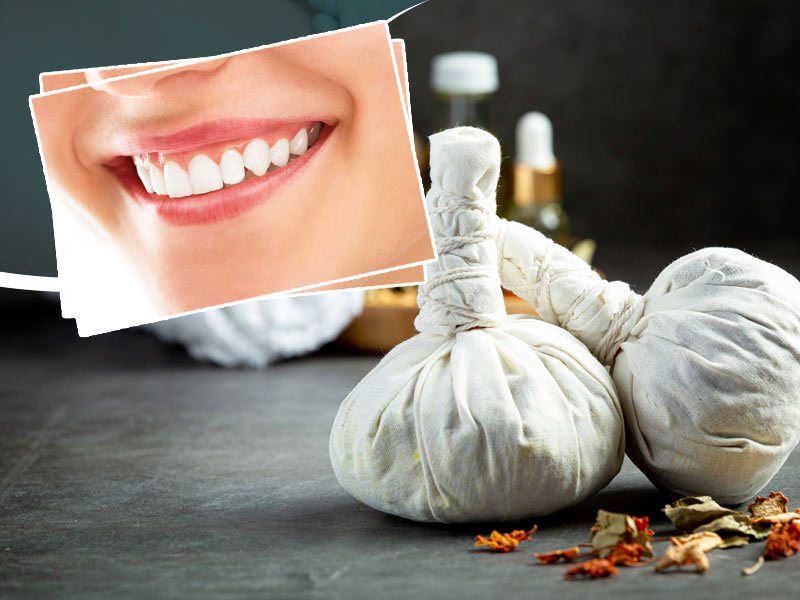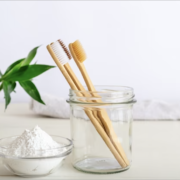A warm and friendly smile may do wonders for your self-esteem and make an impression that won’t soon be forgotten. There are a number of options for teeth whitening, but many individuals would rather use ayurveda methods as they are safe for oral health. The ancient Indian medical system of Ayurveda provides useful knowledge and treatments for keeping tooth and gums healthy. Read on as renowned dentist Dr. Chirag Chamria of Royal Dental Clinics shares his knowledge of Ayurvedic teeth whitening techniques you may attempt in the comfort of your own home.
Importance of Oral Health with Ayurveda
Maintaining good oral health is crucial for overall well-being. Your oral cavity is home to millions of bacteria, some of which are beneficial, while others can be harmful. Poor oral hygiene can lead to various dental issues, including tooth decay, gum diseases, bad breath, and even systemic health problems. Understanding the importance of oral health will motivate you to prioritize proper oral care and seek professional dental assistance when needed.
Prevention of Tooth Decay
Tooth decay, also known as dental caries, is a common oral health problem caused by the interaction between bacteria and the sugars in the food we consume. When bacteria in the mouth break down sugars, they produce acids that attack the tooth enamel, leading to cavities. Regular brushing, flossing, and dental check-ups can help prevent tooth decay and maintain healthy teeth.
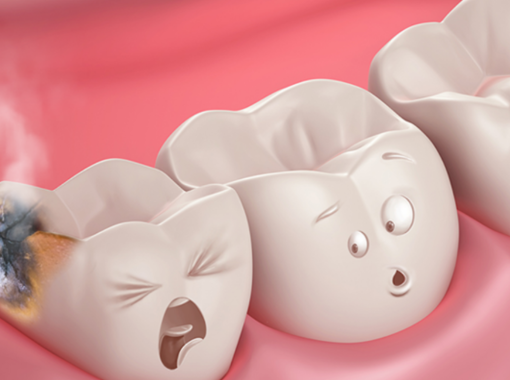
Gum Health and Prevention of Periodontal Diseases
Gum diseases, such as gingivitis and periodontitis, affect the tissues surrounding the teeth. These conditions are caused by the buildup of plaque—a sticky film of bacteria—on the teeth and gums. If left untreated, gum diseases can lead to gum recession, tooth loss, and even contribute to systemic health issues like cardiovascular disease. Proper oral hygiene practices and professional cleanings can help prevent and treat gum diseases.
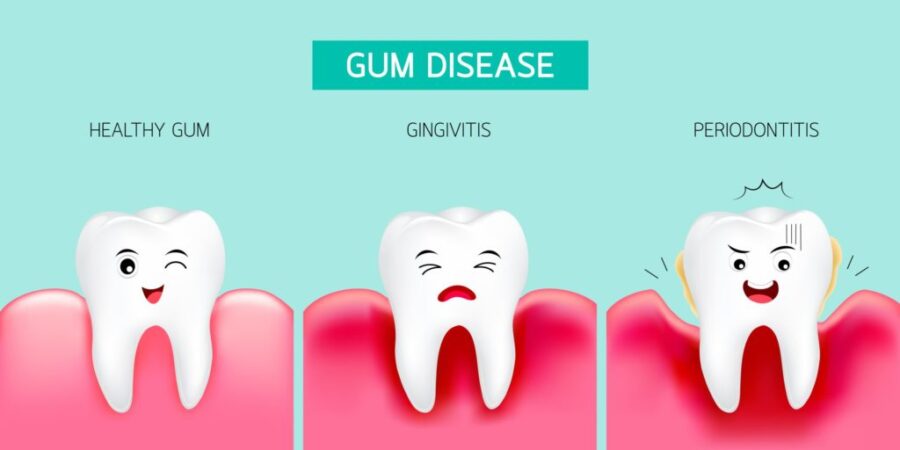
Oral Cancer Detection
Regular dental check-ups are essential for the early detection of oral cancer. Dentists are trained to identify oral abnormalities that may indicate the presence of cancerous or precancerous cells. Early diagnosis increases the chances of successful treatment and recovery. During routine dental visits, your dentist will conduct an oral cancer screening, examining your mouth, throat, and neck for any signs of abnormalities.
Maintaining Fresh Breath | Oral health with Ayurveda
Bad breath, or halitosis, can be embarrassing and impact your self-confidence. It is often caused by poor oral hygiene, gum diseases, dry mouth, or certain medical conditions. Regular brushing, flossing, tongue cleaning, and professional cleanings can help eliminate the bacteria that cause bad breath and maintain a fresh and pleasant breath.

Connection to Systemic Health
Research has shown a link between oral health and systemic health conditions. Poor oral health has been associated with an increased risk of cardiovascular diseases, respiratory infections, diabetes complications, and adverse pregnancy outcomes. Maintaining good oral hygiene and seeking timely dental care can contribute to overall health and well-being.

Psychological and Social Impact
A healthy and attractive smile can significantly impact your confidence, self-esteem, and social interactions. Yellowed, stained, or damaged teeth can make you self-conscious and hesitant to smile. By maintaining good oral health and seeking treatments like teeth whitening or orthodontic procedures, you can improve the aesthetics of your smile and boost your overall confidence.
Incorporating Ayurveda Principles into Oral Health
Incorporating Ayurvedic principles into your oral care routine can provide a holistic approach to maintaining good oral health. Ayurveda emphasizes the balance of mind, body, and spirit, and offers several practices that can benefit your oral hygiene.
Here are some Ayurvedic principles you can incorporate into your daily oral care routine:
Mindful Brushing: Ayurveda stresses careful brushing. Brush your teeth slowly and carefully instead of hurrying. Soft-bristled toothbrush and natural toothpaste. Brush each tooth in a circular motion to eliminate plaque. Overbrushing may harm tooth enamel and gums.
Tongue Scraping: Ayurvedic tongue scraping removes bacteria and poisons. Tongue bacteria cause foul breath and dental health difficulties. Use a stainless steel or copper tongue scraper to gently scrape from back to front. Rinse the scraper after use. This habit improves dental hygiene and breath.
Aloe Vera for Gum Health: Aloe vera soothes and heals gums. For healthy gums and reduced irritation, use fresh aloe vera gel or use a mouthwash. Aloe vera soothes mouth ulcers and other oral irritations.


Oil Pulling (Gandusha): Ayurvedic oil pulling removes toxins and improves dental health by swishing oil in the mouth. Swish a spoonful of coconut, sesame, or other edible oil in your mouth for 15-20 minutes. Spit and rinse. Oil pulling reduces plaque, improves gum health, and whitens teeth.
Herbal Tooth Powders: Ayurveda promotes oral health using antibacterial and anti-inflammatory medicines. Replace toothpaste with neem, clove, cinnamon, or Triphala teeth powders. These natural powders combat germs, decrease inflammation, and maintain healthy gums.
Ayurvedic Mouthwash: After brushing, use an Ayurvedic mouthwash. Before used as a mouthwash, boil water with neem, peppermint, or cloves, filter, and chill. These antimicrobial herbs decrease plaque, freshen breath, and enhance dental health.
Oil Pulling for Oral Health | Ayurveda
Oil pulling is an ancient Ayurvedic practice that can contribute to improved oral health. It involves swishing oil in your mouth for a certain duration to draw out toxins and promote overall oral hygiene. Here’s a closer look at the benefits and steps involved in oil pulling:
Benefits of Oil Pulling
Reduces Harmful Bacteria: Oil pulling helps reduce the number of harmful bacteria in the mouth. The swishing action allows the oil to come into contact with the teeth, gums, and crevices where bacteria can thrive. This can help inhibit the growth of bacteria responsible for dental issues such as tooth decay, gum diseases, and bad breath.
Promotes Gum Health: Oil pulling can contribute to healthier gums by reducing inflammation and preventing the accumulation of plaque. This practice reaches areas that a toothbrush may not reach, allowing the oil to penetrate the gum line and support gum health.
Prevents Bad Breath: By reducing the number of bacteria in the mouth, oil pulling can help freshen breath and combat halitosis. The oil acts as a natural mouthwash, dislodging bacteria that contribute to unpleasant odors.
Steps for Oil Pulling
Choose an Oil: Traditionally, sesame oil was used for oil pulling. However, you can also use other edible oils such as coconut oil, sunflower oil, or olive oil. Coconut oil is a popular choice due to its pleasant taste and additional antimicrobial properties.
Start with a Small Amount: Begin with a tablespoon of oil. As you become more comfortable with the process, you can gradually increase the amount.
Swish the Oil: Take the oil into your mouth and swish it around gently, making sure it reaches all corners of your mouth. Aim to swish the oil for about 15 to 20 minutes. This duration allows enough time for the oil to mix with saliva and for the process to be effective.
Avoid Swallowing: It’s important not to swallow the oil as it may contain toxins and bacteria that you want to remove from your mouth. After the recommended duration, spit out the oil into a trash can. Avoid spitting it into the sink, as the oil can solidify and clog the drain over time.
Rinse and Brush: After oil pulling, rinse your mouth thoroughly with warm water. You can follow up with regular brushing and flossing to remove any residual oil and maintain your oral hygiene routine.
Herbal Remedies for Teeth Whitening
Ayurveda offers a range of herbal remedies that can naturally contribute to teeth whitening. These remedies utilize the properties of certain herbs to help remove stains and promote a brighter smile. Here are some herbal remedies you can try for teeth whitening:
Neem (Azadirachta indica): Antibacterial and anti-inflammatory neem. It protects gums and fights germs. Ayurveda uses “datun,” or neem twigs, as toothbrushes. Neem powder toothpaste may be made by grinding dry leaves and adding water. This toothpaste removes stains and improves oral health.
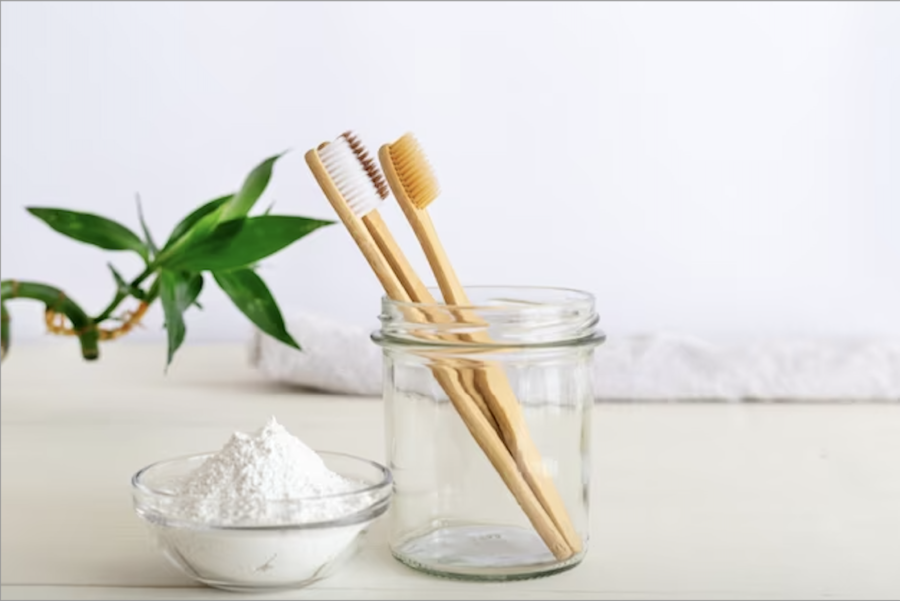
Babool (Acacia arabica): Acacia, or babool, contains astringent qualities that erase tooth stains. Babool bark may be powdered or used as a toothbrush. Brush with a paste made from the powder and water. This aids tooth whitening and oral hygiene.
Triphala: Ayurvedic Triphala contains three fruits: Amalaki (Indian gooseberry), haritaki (Terminalia chebula), and bibhitaki (Terminalia bellirica). It promotes dental health and antioxidants. Triphala powder and water produce a natural toothpaste. Regular usage removes stains and maintains teeth.
Turmeric (Curcuma longa): Curcumin in turmeric whitens naturally. It may discolor surfaces yet eliminate tooth surface stains. Turmeric powder with water or coconut oil produce a paste. After applying the paste, rinse well. Avoid staining clothes and countertops.
Power of Turmeric | Oral Health with Ayurveda
Turmeric, with its active compound curcumin, possesses incredible powers that promote health and well-being. Its anti-inflammatory properties help combat chronic inflammation, while its antioxidant activity neutralizes harmful free radicals. Turmeric shows promise in potential cancer prevention and treatment, aids in digestion, supports joint health, and contributes to brain health by reducing inflammation and oxidative stress.
Additionally, it has been utilized in skincare for its ability to improve complexion, reduce acne, and provide a natural glow. While incorporating turmeric into your routine can be beneficial, it’s important to consult with a healthcare professional for personalized advice and treatments tailored to your specific needs.
Diet and Lifestyle Choices
Diet and lifestyle choices play a significant role in maintaining good oral health and supporting teeth whitening efforts. Here are some dietary and lifestyle tips to consider:
Balanced Diet: Oral health requires a balanced diet of fruits, vegetables, whole grains, lean proteins, and healthy fats. Nutrient deficits may damage teeth and gums. Leafy greens, berries, nuts, and dairy products supply vitamins and minerals for strong teeth and gums.
Limit Sugary and Acidic Foods: Too much sugar and acid may damage teeth and enamel. Limit candy, soda, fruit juices, and citrus fruits. To prevent enamel damage, rinse your mouth with water after eating them and wait 30 minutes before brushing.
Stay Hydrated: Water helps produce saliva, which washes food particles and neutralizes mouth acids. Water keeps teeth and gums healthy.
Avoid Tobacco and Excessive Alcohol Consumption: Smoking and chewing tobacco harm dental health. It causes gum disease, staining, and oral cancer. Alcohol may also cause gum disease and oral cancer. Avoid these behaviours for oral health.
Practice Good Oral Hygiene: Maintaining dental health and lightening teeth requires consistent oral hygiene. Brush twice a day with fluoride toothpaste and a gentle toothbrush. Don’t forget to floss and clean your tongue.
Regular Dental Check-ups: Get regular dental cleanings and exams. Dental specialists can spot and treat oral health concerns early, avoiding them from deteriorating your teeth. They also provide expert tooth whitening.
Manage Stress: Stress may cause bruxism and jaw clenching, which wears enamel and discolors teeth. Meditation, exercise, and relaxation may reduce these oral health impacts.
Conclusion
Achieving a brighter smile doesn’t always require expensive treatments or harsh chemicals. Ayurvedic practices offer a natural and holistic approach to teeth whitening, promoting oral health in the process. By incorporating Ayurvedic principles into your oral care routine, such as oil pulling, using herbal remedies, and being mindful of your diet, you can take significant steps toward achieving a whiter and healthier smile. Remember, while these Ayurvedic tips for teeth whitening can be effective, it’s important to consult with a dental professional like Dr. Chirag Chamria from Royal Dental Clinics for a comprehensive evaluation of your oral health. They can provide personalised advice based on your specific needs and guide you through any necessary dental treatments.
© All rights reserved by Royal Dental Implants Pvt Ltd
Issued in public interest

